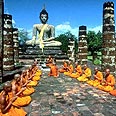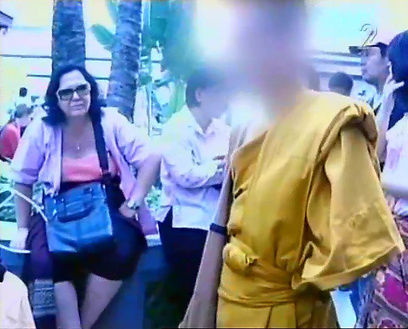
Israeli tourists visiting a shrine in Bangkok were shocked when a child, dressed in an orange Buddhist monk's robe, approached them and began speaking in perfect Hebrew.
The 12-year-old Israeli boy has been staying in a monastery in northern Thailand, and has no idea until when he will remain there. When asked whether he wanted to be taken back home, he answered: "I told everyone already, it's fine, I'm used to it."
Related stories:
- IAF cadet wins battle with cancer
- Thailand remembers Holocaust victims
- Iran confiscates Buddha statues from shops
The story was revealed on Tuesday by Israel's Channel 2 TV, which aired the tourists' conversation with the child.
According to an inquiry by the Foreign Ministry, the child is the son of divorced parents who live in a southern Israel community and lead a Buddhist way of life.
The child was diagnosed with blood cancer when he was three and has undergone a series of treatments, the last of which was a bone-marrow transplant more than two years ago.
According to the parents and the social worker who handled the case, the medical treatment failed, and the parents, at the advice of monks, decided to send him to a Buddhist monastery in Thailand.

The boy in a Thailand monastery (Photo: Channel 2)
The mother explained that thanks to the care he received in the monastery, his blood tests had improved. "There's an enlightened man in the monastery, and he is keeping the boy alive," she told Channel 2 News.
"It's life energy. Do only doctors heal? Doctors don't know how to heal. Doctors can only dismantle the harmful elements. That's a different concept."
When she was informed of her child's wishes to return home, she answered: "When he's 18 he'll decide what he wants to do."
She stressed, "Those who didn't live in the Oncology Ward for four years, who didn't see the children who don't come out, the children twisted from treatment, all the suffering, have no right to judge me when my child is healthy and I'm not willing to take the risk that he'll live in wonderful Israel and come back to the ward."
The mother visits the boy in Thailand alternately with his father. "My boy has been healthy for a year, my boy is learning, my boy is growing, my boy will be a wonderful man and he'll be alive," she said.
The hospital that treated the child said in response that he had undergone a life-saving treatment, including a successful bone-marrow transplant, but follow-ups on his condition were discontinued after a year.
The hospital claimed that without the treatment the child would not have recovered from the disease, and the doctors' opinion is that the follow-ups must continue.
The hospital stressed that treatment in Thailand could not be considered an ample substitute to medical care.
The issue is currently being handled by the Foreign and Welfare ministries, which will decide whether the State should intervene.
Noam Barkan and Ran Ezer contributed to this report















